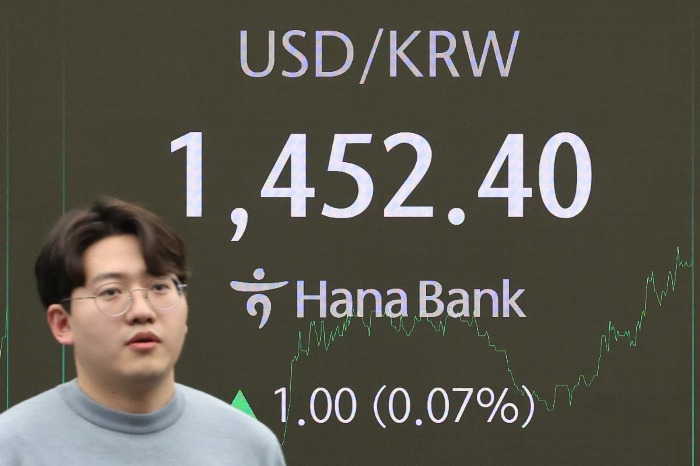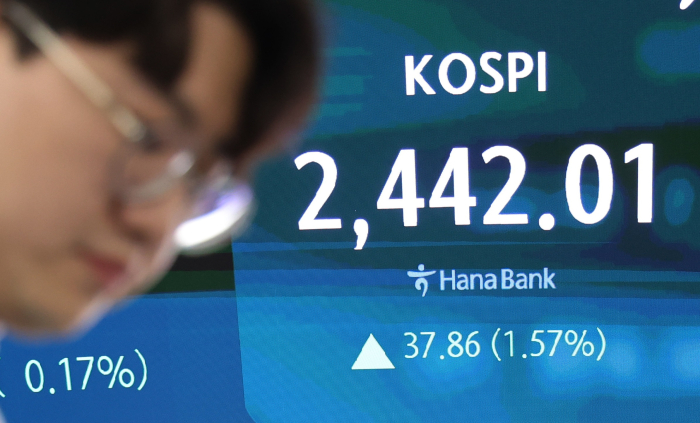Korea to relax FX rules by December to boost dollar selling
Seoul will inject $200 million into the domestic stock market in the immediate future via a second Value-Up Fund
By Dec 23, 2024 (Gmt+09:00)
LG Chem to sell water filter business to Glenwood PE for $692 million


Kyobo Life poised to buy Japan’s SBI Group-owned savings bank


KT&G eyes overseas M&A after rejecting activist fund's offer


StockX in merger talks with Naver’s online reseller Kream


Mirae Asset to be named Korea Post’s core real estate fund operator



South Korea will raise the limits on forward dollar purchases and expand the foreign exchange swap line between the National Pension Service (NPS) and the Bank of Korea by the end of this month, said Choi Sang-mok, deputy prime minister and minister of economy and finance on Monday.
Under the measures, domestic and foreign banks will be allowed to increase dollar buying on the forward market to 75% and 375% against their equity capital, respectively. Their forward dollar purchases are currently restricted to 50% and 250%.
The foreign exchange swap limit between the NPS and the central bank will be raised from the current $50 billion to $65 billion.
The move, aimed at propping up the Korean won, was announced last week, the day after the currency sank to its weakest level against the US dollar in more than 15 years on Thursday. It fell to 1,453.0 per dollar on Thursday, notching its weakest point since March 16, 2009.
An increase in forward dollar purchase limits will likely lead to a rise in dollar selling on the spot market for hedging trade.
As for the NPS, the increased forex swap line will reduce its dollar buying as the national pension operator can secure more dollars from the central bank for overseas investments.
“We will soon implement measures such as increasing the limits on foreign exchange forward trades and the forex swap line with the National Pension Service by the end of this month,” Choi said at a briefing, after a meeting with financial regulators to discuss macroeconomic and financial market conditions.
Bank of Korea Governor Rhee Chang-yong, Financial Services Commission Chairman Kim Byung-hwan and Financial Supervisory Service Governor Lee Bok-hyun attended the gathering.
Choi warned of growing market volatility in the short term and stressed that authorities would closely monitor domestic financial and foreign exchange markets around the clock.
“We are fully ready to respond, if needed, in order to stabilize the market,” he added.
Last week, the US Federal Reserve’s hint at fewer interest rate cuts in 2025 pummeled Korean stocks and the won currency, already reeling from political uncertainties after President Yoon Suk Yeol was impeached on Dec. 14 after his failed martial law attempt.

VALUE-UP FUND
The finance minister also said the government will soon inject another 300 billion won ($206 million) into the domestic stock market via a second Value-Up Fund.
The fund recently raised 300 billion won in commitments from the Korea Exchange and four other securities market-related institutions such as Korea Securities Depository and Korea Securities Finance.
The fund will invest in Value-Up Exchange Traded Funds (ETFs) and stocks included in the value-up index.
The Korea Exchange launched 12 Value-Up ETFs that track the Korea Value-Up Index in November 2024. The index tracks 100 outperforming Korean companies selected in terms of market capitalization, trade value, profitability, shareholder returns and capital efficiency.
REPURCHASE AGREEMENTS
If the domestic financial markets stumble again, the Bank of Korea will provide additional liquidity through repurchase agreements. Since Dec. 4, when Yoon’s martial law was repealed by Parliament, the central bank has bought 19.6 trillion won worth of repos.
Repos are short-term agreements to sell securities and repurchase them later at slightly higher prices. They are typically used to raise short-term capital.
Also, from next month the government will allow banks to increase foreign currency lending to domestic companies, both large and small, for facility spending.
The country has put a tight cap on forex lending to small- and medium-sized enterprises to constrain their foreign debt growth.
Write to Yeonhee Kim at yhkim@hankyung.com
Joel Levin edited this article.
-
 Foreign exchangeSouth Korea to ease foreign exchange regulations, expand FX swap line
Foreign exchangeSouth Korea to ease foreign exchange regulations, expand FX swap lineDec 20, 2024 (Gmt+09:00)
4 Min read -
 Foreign exchangeKorean won seen rebounding after Yoon’s impeachment
Foreign exchangeKorean won seen rebounding after Yoon’s impeachmentDec 15, 2024 (Gmt+09:00)
2 Min read -
 Business & PoliticsKorea’s president impeached over martial law; political turmoil to ease
Business & PoliticsKorea’s president impeached over martial law; political turmoil to easeDec 14, 2024 (Gmt+09:00)
3 Min read -
 Korean stock marketKorean stocks diverge: Winners, losers of Yoon’s martial law debacle
Korean stock marketKorean stocks diverge: Winners, losers of Yoon’s martial law debacleDec 04, 2024 (Gmt+09:00)
3 Min read -
 EconomyKorean economic policy chiefs play down martial law impact
EconomyKorean economic policy chiefs play down martial law impactDec 06, 2024 (Gmt+09:00)
3 Min read -
 MarketsBOK to buy repos to counter martial law-driven market tantrum
MarketsBOK to buy repos to counter martial law-driven market tantrumDec 04, 2024 (Gmt+09:00)
4 Min read -
 Korean stock marketKorean pension funds buy a net $1.2 bn in Kospi stocks in November
Korean stock marketKorean pension funds buy a net $1.2 bn in Kospi stocks in NovemberNov 27, 2024 (Gmt+09:00)
2 Min read -
 Foreign exchangeKorea FX authorities, NPS raise currency swap limit to $50 bn
Foreign exchangeKorea FX authorities, NPS raise currency swap limit to $50 bnJun 21, 2024 (Gmt+09:00)
1 Min read -
 Korean stock marketKospi 200 firms' values sharply below MSCI developed market rivals
Korean stock marketKospi 200 firms' values sharply below MSCI developed market rivalsMay 03, 2024 (Gmt+09:00)
1 Min read -
 Foreign exchangeNPS emerges as savior of Korea’s ailing won currency
Foreign exchangeNPS emerges as savior of Korea’s ailing won currencyOct 20, 2022 (Gmt+09:00)
1 Min read


